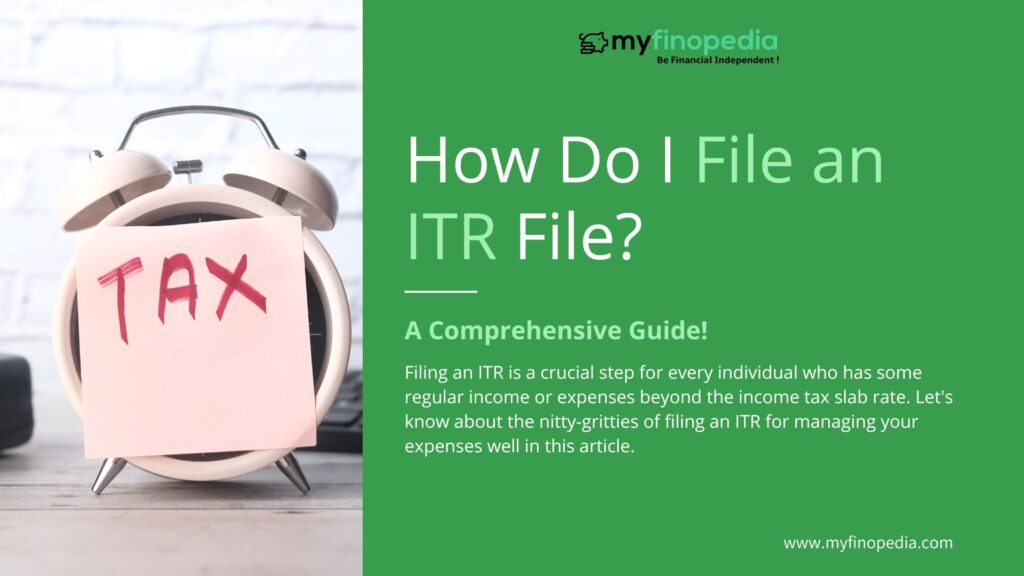We already know filing an ITR for income tax return is a prerequisite for individuals eligible under the income tax slab. However, there can be other more benefits than recording your income & expense in the government portal that the taxpayers get. Filing an ITR gives impeccable tax deductions for some individuals, which ultimately make their finances more secured.
Let’s know about the nitty-gritties of filing an ITR for managing your expenses well in this article.
Why Is It Important?
Filing an ITR is a crucial step for every individual who has some regular income or expenses beyond the income tax slab rate. Gross Total Income (GTR) is that parameter determining the total income coming in your account that amounts to the certain amount that makes you eligible to file tax under the Income Tax Act, 1961.
The most popular reasons to file income tax are:-
- Managing your finances by recording your income, expenses & other financial statements, so that you become a bona fide taxpayer under the Indian government.
- It helps you gain tax exemptions (TDS) that upto (1 lakh, 3 lakhs, or 5 lakhs) according to your eligibility criteria in the income tax slab.
- To carry forward your losses if incurred to the next financial year.
- It makes you eligible to start new business both domestic and international by filing an ITR.
- It gives you sanctions for loans, as they are essential while applying for any.
Apart from that, an ITR file is proof of your current financial situation and that you have all transparency in your transactions. It will help you to counter any future possibilities of legal repercussions or penalties.
Who Should File Income Tax Returns?
According to the Income Tax Act, 1961, any individual whose finances fall above the lowest denomination in the income tax slab is eligible to file ITR. In short, any individual, irrespective of their age group can file income tax files upon certain guidelines.
- For individuals upto 59 years should file Income Tax if their annual income exceeds 2.5 lakh rupees.
- For individuals’ ages between 60-80, whose income margin exceeds 3 lakhs per year.
- Individuals or old citizens between the age of 80 or above are eligible to file income tax if annual earnings exceed 5 lakhs margin.
- Individuals who have certain expenditure spent in travel exceeding upto 2 lakhs.
- Individuals having 1 crore or more deposited in a bank account.
- Individuals or NRIs accruing money from foreign countries, which exceeds 2.5 lakh like the normal taxpayers under the new tax regime.
What is the last date for ITR filing 2023?
As of 2023, the last date of filing ITR is given on 31st July, 2023. Individuals must file before the deadline to avoid further clarifications or penalties.
In the following way, you can file your income tax through online portal:-
- First, you need to log in to the portal of Income Tax Department of the Government of India through www.incometaxindiaefiling.gov.in
- Calculate your tax as per which deductions you get or savings under section 80C of the Income Tax Act, 1961.
- Form 26AS to summarize the TDS deduction amount and tax paid in the current financial year.
- Individuals have to choose the proper form that resonates with their income as if ITR 1 and ITR 4.
- Fill the form with all your financial details properly.
- Enter Form 16 details by downloading it.
- Validate your submission.
- Convert the file into XML and ready to upload in the Income Tax Portal.
- Check your Aadhar, and Pan Card details and your Aadhaar and Pan card link number.
- The acknowledgement form of your ITR file is generated and you can download it for future references.
- Get verification through your mobile number, bank account or demat account.
Wrapping Up
If you’re a salaried individual or business person whose annual income range exceeds 2.5 lakhs margins, it is inevitable to file ITR for your returns. Any individual, not salaried, like house owners, post retirement earners can also file income tax according to the new and old tax regime. Filing an ITR is essential, as it is proof that the government verifies all your channels to income and expenses and you get considerable benefits out of it.






